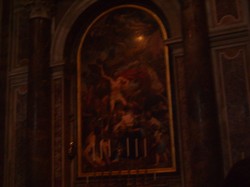The most intractable differences occur within families, and it is the case that Christianity and Islam belong to the same family of religions, the Abrahamic faiths, along with their ancestor Judaism. Both religions worship the same God [despite some claims to the contrary] both value Jesus and Mary, and both have very similar moral teachings. This is not to underplay significant differences between them, but it does meet the requirement of genuine communication, that the two sides must have something in common on which to base their discourse.

How Can Christians Explain Their Faith to Muslims?
by frankbeswick
Many Muslims struggle to understand the Christian faith, but there are ways of explaining it that are sensitive and respectful.
Begin with respect
Firstly, I am quite irritated when people try to convert me, and, so in fairness, I do not go round evangelizing others. Like Pope Francis, I believe that witness, good example, is the best way to proceeed, but if someone asks me to explain my faith I will comply, but I will do it in a sensitive way that places no undue pressure to agree and leaves the questioner room to think. Recently I did a month teaching Humanities [Religion and History] in a school with many Muslim pupils. Several Muslim pupils questioned me, and as always I gave what I hope are honest answers sensitively given. Teachers owe their pupils honesty. I told them that I respect the Koran, but that it is not my book, for mine is the Bible, particularly the New Testament. I must note that I have generally found Muslims respectful to Christian scholars.
Muslims love Mohammed, and no good is ever done by attacking him. I believe that he was a heroic character who was sincere in his beliefs and who worked hard to spread what he believed was the truth in a society that was harsh and brutal. When he became a ruler he introduced good laws that were almost certainly an improvement on what had gone before. Religious experience is one of my theological/philosophical interests and from the standpoint of my studies I believe that Mohammed had a genuine religious experience. But we must be honest enough to be critical. I point out that he was not the only person to have profound religious experiences and that there were others. I regard him as one good man among many. I also reject attacks on his sanity, which I believe discredit the profound experiences that he underwent, are unjust and do no good at all.
Now what really annoys me is a recent attempt by some evangelicals to say that Muslims and Christians do not worship the same God. Yes, there are differences between the two faiths in their respective understandings of the divine nature, but the old Biblical word for God was El, which is etymologically linked to Allah. I suspect that there are political reasons behind this thinking. Certain evangelical groups are linked to right wing Republican sources, who want to exaggerate the differences between Arabs and the West, so they create a religious distinction where it does not exist. It is easier to zap Arabs or Iranians if their God differs from yours. I say to Muslims that the one that they call Allah is the one whom Christians call God the Father. This shows that I have no desire to zap Arabs or Iranians, or indeed, Muslims.
I like to make people aware that the Jewish, Christian and Muslim faiths are all Abrahamic, as they are all religions which stem from the experience of the prophet Abraham about 4200 years ago [roughly.] All of these faiths believe in a personal deity who is ethical, distinct from the world and who cares about humans, interacting with the world to care for them. He can, though, punish wrongdoing. Realizing that we all belong to the stream of faiths that believes in ethical monotheism is a binding influence and establishes something in common as a basis for communication.
Christianity and Islam
 | Christianity and Islam From one of the leading scholars of Islam in the last century comes this exploration of Christianity and Islam. Right from the beginning Becker notes that there are different po... |
The key difference
The main difference between the two faiths, which does require explanation, is the significance of Jesus and the doctrine of the Trinity.
To explain the significance of Jesus Christians have to relate to the Muslim idea that Mohammed was the seal of the prophets. The Muslim case is clear. There is a whole line of prophets, who have all all been given the same message, Islam,but all messages became corrupted, other than the last one, the one from Mohammed. The last prophet has now come, so prophecy is over. Mohammed's message is written forever in a book, the Koran. This is the work of only one author, unlike the Christian Scriptures, which are written by several, so this gives the Koran priority.
There are several Christian criticisms of this idea. Firstly, Christians believe that prophecy has not ended. The ancient belief was that a prophet's disciples share in his prophetic role, and so all Christ's disciples share in his roles of prophet [and also priest and king.] The Muslim case does not therefore have the impact that they think it has. Secondly. Catholics do not see themselves as a religion of the book, as Muslims think. Catholicism regards the revelation of God as being in the church, which is the repository for God's spirit and at whose centre is the risen, living Jesus. The Bible is the product of the church to be used by the church, but it is to be interpreted by the church. so there is not the comparison between Bible and Koran that the Muslims think there is. Whereas the Koran is the foundation stone of Islam, the foundation of Catholicism is the living tradition of the community of the risen Lord.Thirdly, the fact of the multiple authorship of the Bible is not regarded by Christians as a weakness. The Bible is the testimony of a community, so the presence of different authors is not seen as a problem, but as a strength, for one human perspective is inevitably limited compared with the combination of several perspectives.
A Christian, particularly a Catholic, would explain his case by saying that their faith does not lie in a particular book, but in the living church, the community of the risen Lord. Catholic Christians believe that in the church the presence/power of Christ is made available to members through the sacraments, preaching and the liturgy, the prayer of the church,and the Bible, along with all the other aspects of church life. As a Catholic I will testify that the mass, the eucharistic service, is a powerful influence in my life. I have never willingly missed sunday mass, and I credit it as the source of my religious belief and an influence for goodness and holiness in my existence. It is the totality of the community life rather than a single book that is significant for Catholics.
Prophets, Apostles and the King
This takes us to a key point, the authority of prophets. The Muslim case is that a prophet is the messenger of God, and implicit in this is the belief that the highest religious authority is found in prophets. While Christians accept that prophets are divine messengers, there are others, ones of higher status. The early church had prophets, one, Agabus, is quoted in the Acts of the Apostles, and the Apostle Philip had four prophetess daughters. But prophets were not the highest authorities. Higher than prophets were apostles. The term apostle has two senses:it can denote one of the original twelve, but it later came to denote one who had experienced the risen Lord,a witness to Christ after his resurrection. Christians can say therefore that they follow an authority higher than any prophet, and they follow a community of them.
But this takes us further away from Islam. The Bible was composed not only by prophets, but by wise people. There is a powerful corpus of Wisdom literature in the text, testifying to the Judaeo-Christian belief that prophets are not the only religious authorities. The sages of Israel had their place and authority, even though they were not prophets, and the Judaeo-Christian community testifies to their message and its importance. Christians would also value the insights of mystics. They would say, therefore, that founding a religion on the works of one prophet is risky,narrow and unjustified.
Christians go further, for they believe that their faith was rooted in a person who was a prophet, but more than a prophet, higher indeed than an apostle, for the apostles, themselves superior to prophets, bowed to him. Christians realize that Jesus was a prophet, but he was also known as rabbi, teacher. This links him to the wisdom tradition of Israel. Yet, as Tom Wright says in his excellent book, Simply Jesus, Jesus went around behaving as if he were in charge. He spoke and acted with kingly authority. This is one far higher than any prophet or apostle. Jesus is one who combines all religious roles and sources of authority.
The Muslim case that Jesus taught Islam and the church corrupted it has never had any real impact outside Islam, though it chimes in with the works of liberal protestants who hoped to re-invent Jesus in the image of a post-enlightenment intellectual. The idea that the apostles let any of Jesus' teaching become corrupted is unjustified. They were prepared to die for them. After the ascension the church had to reflect on the significance of Jesus, and this produced centuries of theological reflection, but this was not a replacement of Jesus' teaching, but a necessary endeavour to get to grips with the powerful experience that was Christ
Simply Jesus
 | Simply Jesus - Who He Was, What He Did, Why it Matters Who was - and is - Jesus of Nazareth? This is a simple question that every Christian must ask. A multitude of different voices and centuries of church tradition have made it dif... |
Jesus and the Trinity
The stumbling block for Muslims is the Trinity, the strange doctrine at the heart of orthodox Christianity. The doctrine is that God is three in one: Father, Son and Spirit. Muslims struggle with this, and several think that Christians worship three Gods. But Christians insist that they believe in one God, who is a complex and strange reality that does not fit easily into any known model from within the world. This is to be expected. The commonsense world that we dwell in does not explain all realities in the strange world revealed by subatomic Physics, which defies conventional concepts, so it is unsurprising that God, the even more mysterious reality that humans worship, is utterly beyond conventional understanding and cannot be explained simply or conventionally.
But why do Christians believe in the Trinity anyway? They do so because they have to explain and account for the immense charisma of Jesus Christ and the strange events of his life. At this point we see in certain healings, such as Jairus' daughter [Mark 5], the paralytic man [Mark 2] and the Son of the Widow of Nain, Jesus not only displayed a knowledge of people's condition beyond the normal, but his voice could speak to the depths of the soul and be effective. Pilate, the cynical Roman official,soon realized that he was dealing with a charismatic person, and after the meeting with the risen Jesus on the road to Emmaus, the disciples said "Did not our hearts burn within us when he explained the Scriptures." Jesus seemed to have had immense charisma and spoke with such authority that even after his departure the church sensed his presence/power. They were driven to realize that to explain him they had to speak of him in terms of divinity, even though it was puzzling and challenging to do so. They were forced to go beyond conventional thinking to explain a new religious experience.
They began to use the term Son of God to describe him. This term puzzles and worried Muslims. but they must see that the word Son is a metaphor. Like all metaphors it can be described as true, but not taken literally. He is not the Son in the sense that I am the son of Cyril Beswick. But the term means that he came from God and that God's presence was in him in a way more than it was in other inspired humans. For Christians the wisdom, word and glory of God were fully made manifest in Jesus. Thus they regard him as the incarnation of God, God's way of showing what his character is and his way of walking among humans as a participant in humanity. The events of Jesus' life, through his cross and resurrection were seen as revelations of the divine mystery.
The Spirit, about which Jesus spoke, makes up the third aspect/person of the Trinity. Christian teaching is that through the Son and the Spirit God has crossed the gap between him and humanity, a grap across which humans cannot jump by their own efforts. For the Franciscan theologian Bonaventure, the risen Jesus was at the centre and axis of the world and indeed intimately present in the lives of his people.
God
 | What is the Trinity? (Crucial Questions (Reformation Trust)) The Trinity is truly a mystery. This doctrine teaches that the God of Christianity is one in His essence but three in His persons--the Father, the Son, and the Holy Spirit. Thou... |
Conclusion
Muslims are the only religion other than Christianity which finds a place for Jesus, whom they regard as a prophet. This means that Christians and they should share a common bond. I am left with the message purportedly given by Mary, Jesus' mother, when she is said to have appeared at Medugorje in Bosnia. "Christians and Muslims should not fight. God loves you both." I do not know whether the apparition was genuine, but the message is one that Mary would have given.
You might also like
The North Wales Pilgrim PathA pilgrim way in an ancient land hallowed by years of use is an inspiring jou...
Why Be Religious?Non-believers are often puzzled by the survival of religious belief , so reli...








 Pilgrimage. A reviewon 06/15/2025
Pilgrimage. A reviewon 06/15/2025
 Leo the Fourteenthon 05/09/2025
Leo the Fourteenthon 05/09/2025
 The Melsonby Hoardon 03/25/2025
The Melsonby Hoardon 03/25/2025



Comments
No. The one piece of burial linen saved was the shroud.
This question accords with your wizzley as about Jesus Christ. It accords not at all with Christian and Muslim dialogue.
Icelandic copyright attorney, copyright-law professor, poet and prosist Ragnar Jónasson admires English detectivist Agatha Christie. His book, Death at the Sanatorium -- from 2024, afore The Mysterious Case of the Missing Crime Writer for Sep. 9, 2025 -- broaches seven Christie novels. Christie's The Murder of Roger Ackroyd describes the latter as devoting desk space to his collection prize, a baby shoe of King Charles I.
That memento inspires me to imagine such inspirational, inspiring, valuable collectibles as the burying linen and the shroud of Turin.
Is there a tradition as to all the pieces of the burying linen of Jesus Christ?
There are none known.
English Wikipedia contains among its information concerning Keturah Jewish traditions of her as descendant of Noah's second or third son, Japheth.
Its information concerning Ishmael contains the Muslim tradition of Mohammed as direct descendant of Ishmael.
The combined information includes the Jewish tradition of Keturah as Hagar.
Might there be any such Christian tradition regarding the above family history?
The Dalai Lama interprets Jesus according to his ownphilosophy, Christians however attribute Jesus' wisdom to his closeness to God.
Zoroastrianism certainly influenced Judaism, which was why the Pharisees got their name, which means Persians. Therevwas a Buddhist influence in Egypt when Asoka sent missionaries round a range of countries, but it left no trace. Buddhism does not believe in a supreme God, but Jesus was totally God focused, so there seems little or no influence on Jesus from that source. Buddhism is monastic, but Jesus never founded a monastery or advocated monastic living.
The article Was Jesus a Buddhist? by James M. Hanson appeared in volume 25 of Buddhist-Christian Studies through University of Hawai'i Press in 2005.
The author argues that Buddhism and Zoroastrianism influenced Jesus and early Christian and Judean culture and thought.
The Dalai Lama attributes past lives that awarded Jesus with a high state of enlightenment if not Bodhisattvahood (Buddha in waiting).
Have you heard about suggestions of Buddhist and Zoroastrian influences on Jesus Christ, early Christians and Judean Jewish culture?
Religion can only be advanced by sensitive dialogue undertaken in mutual respect for the participants. There is no room for harshness and power-seeking anywhere in the process. Authoritarianism is a form of bullying and should be dispensed with. It has no part in religious discussion.
I never knew that Christianity and Islam had stemmed from the same Abrahamic faith! Like WriterArtist mentioned, I too had part of my education done in a missionary school and some of my best friends are Christians. I also have Muslim friends. There was a short period of time when I was confused about praying in a church, but my view on that changed very soon and I have visited churches with my Christian friends. And my Christian have visited temples with me too. I think it is more easy to accept and understand others beliefs when you have close friends from other religions. I very much agree that the love for power is the most damaging thing when it comes to religions, as many people try to do whatever they can to retain the power.
Having spent some years as a trainee religious minister [I left early in the course] my belief is that the main source of corruption in religion is the love of power. Too many religious ministers love their own power and status and seek to make people servile. They seek to control people's minds to boost their own positions.